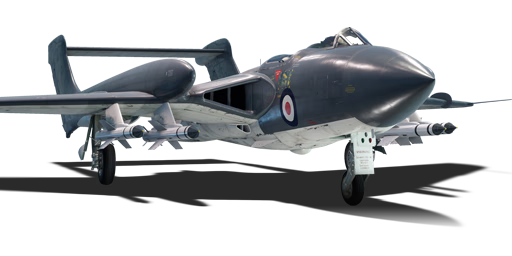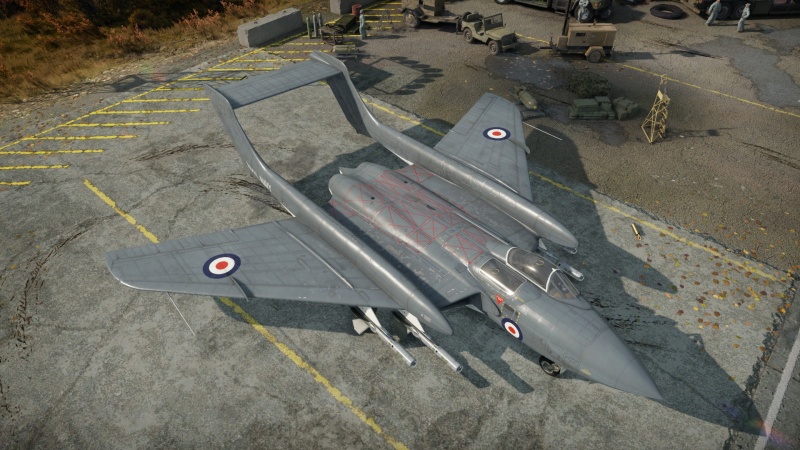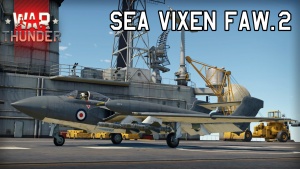Difference between revisions of "Sea Vixen F.A.W. Mk.2"
(Added manufacturer) |
(→Survivability and armour: Added game screenshots to the article.) (Tag: Visual edit) |
||
| Line 9: | Line 9: | ||
== General info == | == General info == | ||
| + | [[File:Sea Vixen Wiki Image 5.jpg|thumb|Sea Vixen after using one of its [[Red Top]] AAM's.]] | ||
| + | |||
=== Flight performance === | === Flight performance === | ||
{{Specs-Avia-Flight}} | {{Specs-Avia-Flight}} | ||
| Line 102: | Line 104: | ||
|} | |} | ||
| − | === Survivability and armour === | + | [[File:Sea Vixen Wiki Image 2.jpg|thumb|Sea Vixen flying on [[Frozen Pass (Ground Forces)|Frozen Pass]].]] |
| + | |||
| + | === Survivability and armour === | ||
{{Specs-Avia-Armour}} | {{Specs-Avia-Armour}} | ||
<!-- ''Examine the survivability of the aircraft. Note how vulnerable the structure is and how secure the pilot is, whether the fuel tanks are armoured, etc. Describe the armour, if there is any, and also mention the vulnerability of other critical aircraft systems.'' --> | <!-- ''Examine the survivability of the aircraft. Note how vulnerable the structure is and how secure the pilot is, whether the fuel tanks are armoured, etc. Describe the armour, if there is any, and also mention the vulnerability of other critical aircraft systems.'' --> | ||
| Line 112: | Line 116: | ||
== Armaments == | == Armaments == | ||
{{Specs-Avia-Armaments}} | {{Specs-Avia-Armaments}} | ||
| + | [[File:Sea Vixen Wiki Image 3.jpg|thumb|Sea Vixen launching a [[Firestreak]] AAM.]] | ||
| + | |||
=== Suspended armament === | === Suspended armament === | ||
{{Specs-Avia-Suspended}} | {{Specs-Avia-Suspended}} | ||
| Line 150: | Line 156: | ||
<!-- ''Describe the tactics of playing in the aircraft, the features of using aircraft in a team and advice on tactics. Refrain from creating a "guide" - do not impose a single point of view, but instead, give the reader food for thought. Examine the most dangerous enemies and give recommendations on fighting them. If necessary, note the specifics of the game in different modes (AB, RB, SB).'' --> | <!-- ''Describe the tactics of playing in the aircraft, the features of using aircraft in a team and advice on tactics. Refrain from creating a "guide" - do not impose a single point of view, but instead, give the reader food for thought. Examine the most dangerous enemies and give recommendations on fighting them. If necessary, note the specifics of the game in different modes (AB, RB, SB).'' --> | ||
''Describe the tactics of playing in the aircraft, the features of using aircraft in a team and advice on tactics. Refrain from creating a "guide" - do not impose a single point of view, but instead, give the reader food for thought. Examine the most dangerous enemies and give recommendations on fighting them. If necessary, note the specifics of the game in different modes (AB, RB, SB).'' | ''Describe the tactics of playing in the aircraft, the features of using aircraft in a team and advice on tactics. Refrain from creating a "guide" - do not impose a single point of view, but instead, give the reader food for thought. Examine the most dangerous enemies and give recommendations on fighting them. If necessary, note the specifics of the game in different modes (AB, RB, SB).'' | ||
| + | |||
| + | [[File:Sea Vixen Wiki Image 4.jpg|thumb|Sea Vixen after destroying a target with its [[AGM-12B Bullpup|AGM-12B]] Bullpup.]] | ||
=== Pros and cons === | === Pros and cons === | ||
| Line 181: | Line 189: | ||
<!-- ''Describe the history of the creation and combat usage of the aircraft in more detail than in the introduction. If the historical reference turns out to be too long, take it to a separate article, taking a link to the article about the vehicle and adding a block "/History" (example: <nowiki>https://wiki.warthunder.com/(Vehicle-name)/History</nowiki>) and add a link to it here using the <code>main</code> template. Be sure to reference text and sources by using <code><nowiki><ref></ref></nowiki></code>, as well as adding them at the end of the article with <code><nowiki><references /></nowiki></code>. This section may also include the vehicle's dev blog entry (if applicable) and the in-game encyclopedia description (under <code><nowiki>=== In-game description ===</nowiki></code>, also if applicable).'' --> | <!-- ''Describe the history of the creation and combat usage of the aircraft in more detail than in the introduction. If the historical reference turns out to be too long, take it to a separate article, taking a link to the article about the vehicle and adding a block "/History" (example: <nowiki>https://wiki.warthunder.com/(Vehicle-name)/History</nowiki>) and add a link to it here using the <code>main</code> template. Be sure to reference text and sources by using <code><nowiki><ref></ref></nowiki></code>, as well as adding them at the end of the article with <code><nowiki><references /></nowiki></code>. This section may also include the vehicle's dev blog entry (if applicable) and the in-game encyclopedia description (under <code><nowiki>=== In-game description ===</nowiki></code>, also if applicable).'' --> | ||
===[[wt:en/news/7160-development-sea-vixen-faw-2-breaking-convention-en|Devblog]]=== | ===[[wt:en/news/7160-development-sea-vixen-faw-2-breaking-convention-en|Devblog]]=== | ||
| + | [[File:Sea Vixen Wiki Image 1.jpg|thumb|Sea Vixen on HMS Ark Royal (R09).]] | ||
Development of the Sea Vixen began in 1946 when de Havilland entered talks with the Admiralty on designing a future radar-equipped naval jet fighter with all-weather capability. Official requirements were drawn up in January 1947, by which time however de Havilland was already working on a design based on the preceding Vampire and Venom fighters designated DH 110. | Development of the Sea Vixen began in 1946 when de Havilland entered talks with the Admiralty on designing a future radar-equipped naval jet fighter with all-weather capability. Official requirements were drawn up in January 1947, by which time however de Havilland was already working on a design based on the preceding Vampire and Venom fighters designated DH 110. | ||
| Line 193: | Line 202: | ||
;Skins | ;Skins | ||
| + | |||
* [https://live.warthunder.com/feed/camouflages/?vehicle=dh_110_sea_vixen Skins and camouflages for the {{PAGENAME}} from live.warthunder.com.] | * [https://live.warthunder.com/feed/camouflages/?vehicle=dh_110_sea_vixen Skins and camouflages for the {{PAGENAME}} from live.warthunder.com.] | ||
Revision as of 20:34, 5 August 2021
Contents
Description
The DH.110 Sea Vixen F.A.W. Mk.2 is a premium rank British jet fighter with a battle rating of (AB), (RB), and (SB). It was introduced in Update "Red Skies".
General info
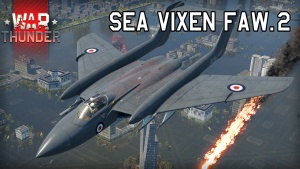
Flight performance
| Characteristics | Max Speed (km/h at 100 m) |
Max altitude (metres) |
Turn time (seconds) |
Rate of climb (metres/second) |
Take-off run (metres) | |||
|---|---|---|---|---|---|---|---|---|
| AB | RB | AB | RB | AB | RB | |||
| Stock | 1,109 | 1,093 | 24.5 | 25.5 | 42.7 | 39.4 | 325 | |
| Upgraded | 1,117 | 1,109 | 23.6 | 24.0 | 68.8 | 55.0 | ||
Details
| Features | |||||
|---|---|---|---|---|---|
| Combat flaps | Take-off flaps | Landing flaps | Air brakes | Arrestor gear | Drogue chute |
| X | ✓ | ✓ | ✓ | ✓ | X |
| Limits | ||||||
|---|---|---|---|---|---|---|
| Wings (km/h) | Gear (km/h) | Flaps (km/h) | Max Static G | |||
| Combat | Take-off | Landing | + | - | ||
| N/A | 407 | 324 | ~9 | ~5 | ||
| Optimal velocities (km/h) | |||
|---|---|---|---|
| Ailerons | Rudder | Elevators | Radiator |
| < 685 | < 750 | < 440 | N/A |
Engine performance
| Engine | Aircraft mass | |||||
|---|---|---|---|---|---|---|
| Engine name | Number | Basic mass | Wing loading (full fuel) | |||
| Rolls-Royce Avon Mk.208 | 2 | 12,872 kg | 291 kg/m2 | |||
| Engine characteristics | Mass with fuel (no weapons load) | Max Takeoff Weight | ||||
| Weight (each) | Type | 8m fuel | 20m fuel | 26m fuel | ||
| 2,361 kg | Axial-flow turbojet | 14,274 kg | 16,359 kg | 17,545 kg | 21,205 kg | |
| Maximum engine thrust @ 0 m (RB/SB) | Thrust to weight ratio @ 0 m (100%) | |||||
| Condition | 100% | WEP | 8m fuel | 20m fuel | 26m fuel | MTOW |
| Stationary | 5,029 kgf | N/A | 0.70 | 0.61 | 0.57 | 0.47 |
| Optimal | 5,029 kgf (0 km/h) |
N/A | 0.70 | 0.61 | 0.57 | 0.47 |
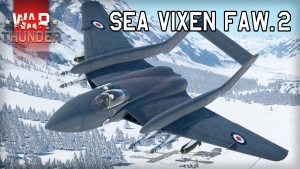
Survivability and armour
The Sea Vixen FAW.2 has no armour plates or bulletproof glass. The engines are both mounted in the centre of the airframe, with fuel tanks mainly in the wings. The tail overall is fairly weak and can be blown off easily by large calibre cannons, however the flap on the rear of the elevator can sometimes absorb shots, protecting the main elevator from damage. Unfortunately the Sea Vixen generally handles poorly when damaged, performance is reduced fairly significantly by damage to the wings and asymmetric damage can make control very difficult.
Modifications and economy
Armaments
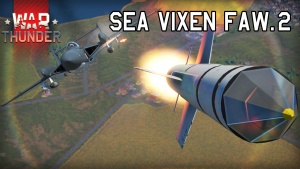
Suspended armament
The Sea Vixen F.A.W. Mk.2 can be outfitted with the following ordnance:
- 4 x Firestreak missiles
- 4 x 500 lb H.E. M.C. Mk.II bombs (2,000 lb total)
- 4 x 540 lb Mk.M1 bombs (2,160 lb total)
- 2 x 1,000 lb G.P. Mk.I bombs (2,000 lb total)
- 2 x 1,000 lb G.P. Mk.I bombs + 4 x 500 lb H.E. M.C. Mk.II bombs (4,000 lb total)
- 2 x AGM-12B Bullpup missiles
- 4 x Red Top missiles
- 144 x RN rockets
- 16 x RP-3 rockets
- 24 x AP Mk II rockets
- 2 x Firestreak missiles + 2 x AGM-12B Bullpup missiles
- 2 x AGM-12B Bullpup missiles + 72 x RN rockets
- 2 x Red Top missiles + 8 x RP-3 rockets
- 2 x Red Top missiles + 12 x AP Mk II rockets
- 2 x Red Top missiles + 2 x AGM-12B Bullpup missiles
- 2 x Firestreak missiles + 72 x RN rockets
- 2 x Red Top missiles + 72 x RN rockets
- 8 x RP-3 rockets + 2 x 500 lb H.E. M.C. Mk.II bombs (1,000 lb total)
- 12 x AP Mk II rockets + 2 x 500 lb H.E. M.C. Mk.II bombs (1,000 lb total)
- 2 x Red Top missiles + 2 x AGM-12B Bullpup missiles + 2 x 500 lb H.E. M.C. Mk.II bombs (1,000 lb total)
- 2 x AGM-12B Bullpup missiles + 72 x RN rockets + 2 x 500 lb H.E. M.C. Mk.II bombs (1,000 lb total)
- 2 x Firestreak missiles + 2 x AGM-12B Bullpup missiles + 2 x 500 lb H.E. M.C. Mk.II bombs (1,000 lb total)
- 4 x Firestreak missiles + 2 x 1,000 lb G.P. Mk.I bombs (2,000 lb total)
- 4 x Red Top missiles + 2 x 1,000 lb G.P. Mk.I bombs (2,000 lb total)
- 144 x RN rockets + 2 x 1,000 lb G.P. Mk.I bombs (2,000 lb total)
Usage in battles
Describe the tactics of playing in the aircraft, the features of using aircraft in a team and advice on tactics. Refrain from creating a "guide" - do not impose a single point of view, but instead, give the reader food for thought. Examine the most dangerous enemies and give recommendations on fighting them. If necessary, note the specifics of the game in different modes (AB, RB, SB).
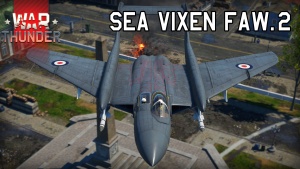
Pros and cons
Pros:
- Very high top speed of over 1,100 km/h at sea level
- Good acceleration thanks to its two powerful engines
- Red Top missiles can be very hard to dodge when used correctly
- Climbs better than most aircraft it faces
- Is surprisingly manoeuvrable
- Can carry AGM-12B Bullpup air-to-ground missiles
- Decent ground attack ordnance loadouts
- Can drop bombs / fire rockets separately instead of in pairs
- Can take-off and land from aircraft carriers
- The AI Mk.18 radar is better than that found on most aircraft you face.
Cons:
- The Sea Vixen has no guns or cannons, relying entirely on missiles for air-to-air combat
- Missiles are rear-aspect only so you cannot engage targets you are approaching head-on (or from the front aspect in general)
- Although you can use RN rockets for air-to-air they are very hard to aim and are impact fuse only
- Both Red Top and Firestreak missiles do not have great range when fired from directly behind a target.
- Only having four air-to-air missiles with no other air-to-air armament limits how many kills you can get without re-arming
- Unlike in aircraft with guns you cannot opportunistically kill ground targets while flying around
- Targets with flares can be very hard to kill
- Having only missiles enforces a fairly high minimum engagement range on you (missiles require time to start tracking after launch, and arm their proximity fuse).
History
Devblog
Development of the Sea Vixen began in 1946 when de Havilland entered talks with the Admiralty on designing a future radar-equipped naval jet fighter with all-weather capability. Official requirements were drawn up in January 1947, by which time however de Havilland was already working on a design based on the preceding Vampire and Venom fighters designated DH 110.
Despite decreasing interest in the project by the late 1940's, in September 1951, the first prototype conducted its maiden flight. However, only a year later, the same prototype crashed during an air show, thus further impeding the project's progress. While the RAF abandoned the idea of purchasing the DH 110 by the mid 1950's, the FAA gained a renewed interest in the aircraft and placed an order for 110 machines to be built in February 1955. Along with the order, the DH 110 received its official designation 'Sea Vixen'.
As the Sea Vixen entered service with the FAA in 1959, de Havilland took note of the feedback gained from operational use of the aircraft and continued working on the Sea Vixen in an effort to improve its design. As a result, the Sea Vixen FAW.2 made its debut in 1962 which featured a number of improvements, of which one of the more notable ones was the ability to carry the Red Top air-to-air missiles. Over 140 Sea Vixens were built, most of which were converted over to the FAW.2 modification after its commissioning into service.
Although the British Sea Vixens never took part in any wars, they were still involved in a number of different combat operations primarily in Africa and the Middle East where they provided fire support for ground troops and flew patrols.
Media
- Skins
- Images
- Sea Vixen F.A.W. Mk.2 Devblog Images
- Videos
See also
External links
- [Development] Sea Vixen FAW.2: Breaking Convention
- Official data sheet - more details about the performance
| De Havilland Aircraft Company Limited | |
|---|---|
| Fighters | Hornet Mk.I · Hornet Mk.III · Mosquito FB Mk VI · Mosquito FB Mk XVIII |
| Jet fighters | Vampire F.B.5 · Venom FB.4 · Sea Venom FAW 20 · Sea Vixen F.A.W. Mk.2 |
| Export | ␗Mosquito FB.Mk.26 · ▄Vampire FB 52A(Italy) · ▄Vampire FB 52A(Finland) · A28B |
| Britain jet aircraft | |
|---|---|
| Blackburn | Buccaneer S.1 · Buccaneer S.2 · Buccaneer S.2B |
| British Aerospace | Harrier GR.7 · Sea Harrier FRS.1 (e) · Sea Harrier FRS.1 · Sea Harrier FA 2 |
| British Aircraft Corporation | Strikemaster Mk.88 |
| English Electric | Canberra B Mk 2 · Canberra B (I) Mk 6 · Lightning F.6 · Lightning F.53 |
| Gloster | Meteor F Mk 3 · Sea Meteor F Mk 3 · Meteor F Mk 4 G.41F · Meteor F Mk 4 G.41G · Meteor F Mk 8 G.41K · Meteor F Mk.8 Reaper |
| Javelin F.(A.W.) Mk.9 | |
| de Havilland | Vampire F.B.5 · Venom FB.4 · Sea Venom FAW 20 · Sea Vixen F.A.W. Mk.2 |
| Hawker | Sea Hawk FGA.6 · Hunter F.1 · Hunter F.6 · Hunter FGA.9 · Harrier GR.1 · Harrier GR.3 |
| Panavia | Tornado GR.1 · Tornado GR.4 · Tornado F.3 · Tornado F.3 Late |
| SEPECAT | Jaguar GR.1 · Jaguar GR.1A · Jaguar IS |
| Supermarine | Attacker FB 1 · Attacker FB.2 · Scimitar F Mk.1 · Swift F.1 · Swift F.7 |
| Foreign | Phantom FG.1 (USA) · Phantom FGR.2 (USA) · F-4J(UK) Phantom II (USA) |
| Australia | F-111C |
| India | ▄MiG-21 Bison |
| South Africa | ▄JAS39C |
| Britain premium aircraft | |
|---|---|
| Fighters | Tuck's Gladiator Mk II · ▄Boomerang Mk I · ▄Boomerang Mk II · ▄D.520 |
| ▄Martlet Mk IV · ▄Corsair F Mk II · ▄Hellcat Mk II · ▄Thunderbolt Mk.1 · ▄Mustang Mk IA | |
| Hurricane Mk.I/L FAA M · Spitfire Mk.IIa Venture I · Spitfire F Mk IXc · Plagis' Spitfire LF Mk IXc · Spitfire F Mk XIVc · Prendergast's Spitfire FR Mk XIVe | |
| Typhoon Mk Ib · MB.5 | |
| Twin-engine fighters | Hornet Mk.I · Whirlwind P.9 |
| Jet fighters | Attacker FB.2 · Hunter FGA.9 · Lightning F.53 · Meteor F Mk.8 Reaper · Sea Vixen F.A.W. Mk.2 · F-4J(UK) Phantom II · ▄MiG-21 Bison |
| Strike aircraft | ▄Wirraway · Beaufighter Mk I (40-mm) · Wyvern S4 |
| Harrier GR.1 · Strikemaster Mk.88 | |
| Bombers | ▄Avenger Mk II · ▄Boston Mk I · ▄Catalina Mk IIIa · ▄DB-7 · ▄Havoc Mk I · ▄Hudson Mk V · Swordfish Mk II |


